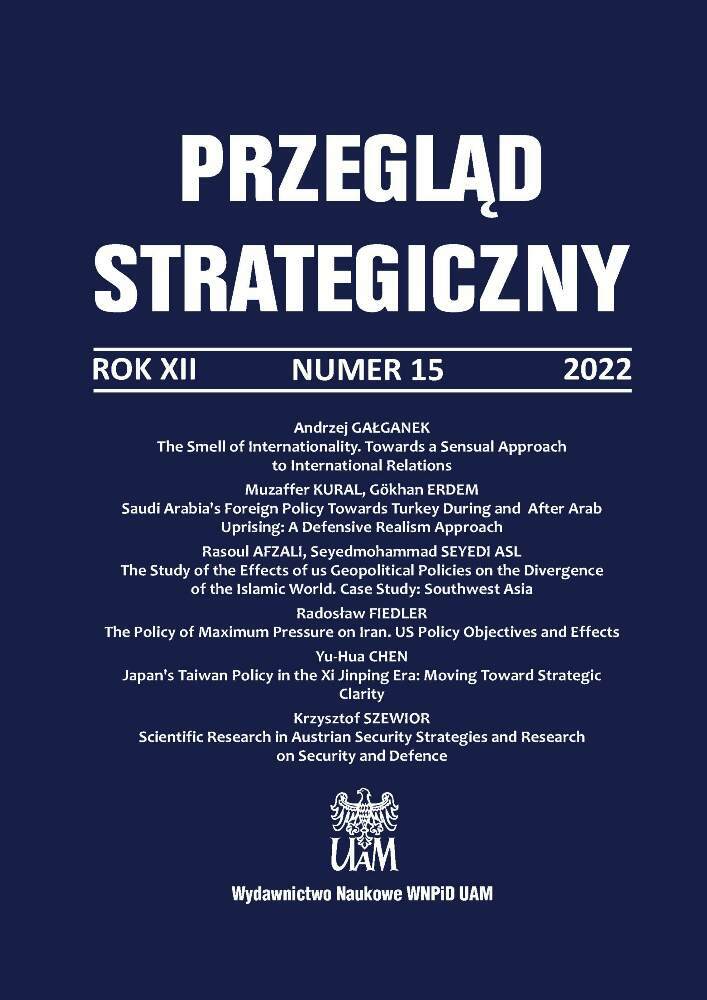Abstrakt
W artykule analizie poddano postawy administracji G. W Busha, Baracka Obamy oraz Donalda J. Trumpa wobec kwestii zagrożenia nuklearnego ze strony Korei Północnej. W badaniu zastosowano model krytycznej analizy dyskursu (CDA) Fairclougha jako nowe podejście do badania tego tematu. Analizując 17 korpusów przemówień, niniejsze badanie rzuca światło na politykę zagraniczną przyjętą przez administracje G. W Busha, Baracka Obamy oraz Donalda J. Trumpa wobec zagrożeń związanych z programem atomowym Korei Północnej. Jako podstawą teoretyczną autorka posłużyła się zarówno modelem analizy stosunków międzynarodowych K. Waltza, jak również perswazją w ujęciu arystotelesowskim. Artykuł ten wyjaśnia również pierwotne podstawy polityki zagranicznej każdego z prezydentów w oparciu o cztery szkoły myślenia amerykańskich badań nad stosunkami międzynarodowymi. Wyniki analizy wskazują, iż dziedzictwo zimnej wojny nadal kształtuje i wpływa na postawy prezydentów USA wobec KRLD, pomimo różnic w ich strategiach retorycznych i politycznych. Podczas gdy niniejsze badanie koncentruje się indywidualnie na urzędzie prezydenckim jako głównej jednostce analizy, przyszłe badania mogą jeszcze bardziej rozszerzyć wykorzystanie analizy CDA np. do zbadania roli i zachowania innych kluczowych członków administracji prezydenckich, aby w pełni zrozumieć związek pomiędzy różnymi dyskursami a strukturą władzy.
Bibliografia
Ahn T. (2012), Patience or Lethargy? U.S. Policy toward North Korea under the Obama Administration, “North Korean Review”, Vol. 8, No. 1, http://dx.doi.org/10.3172/NKR.8.1.67. DOI: https://doi.org/10.3172/NKR.8.1.67
Banta B. (2013), Analyzing discourse as a causal mechanism, “European Journal of International Relations”, Vol. 19, No. 2, https://doi.org/10.1177/1354066111428970. DOI: https://doi.org/10.1177/1354066111428970
Beczkowska J. (2019), Korean Crisis and a War of Words, “International Studies: Interdisciplinary Political & Cultural Journal”, Vol. 23, No. 1, http://dx.doi.org/10.18778/1641-4233.23.07. DOI: https://doi.org/10.18778/1641-4233.23.07
Boot M. (2004), Neocons, “Foreign Policy”, No. 140, https://doi.org/10.2307/4147516 (22.07.2021). DOI: https://doi.org/10.2307/4147516
Brands H. W. (2001), The Four Schoolmasters, “The National Interest”, No. 66, https://nationalinterest.org/bookreview/the-four-schoolmasters-1181 (03.05.2021).
Clinton H. (2011), America’s Pacific century: The future of geopolitics will be decided in Asia, not in Afghanistan or Iraq, and the united states should be right at the centre of the action, “Foreign Policy”, No. 189, https://foreignpolicy.com/2011/10/11/americas-pacific-century/ (29.10.2021).
Difilippo A. (2014), Steady State: The North Korean Nuclear Issue from Bush to Obama, “Asian Affairs: An American Review”, Vol. 41, No. 2, https://doi-org.zulib.idm.oclc.org/10.1080/00927678.2014.910423. DOI: https://doi.org/10.1080/00927678.2014.910423
Edwards B. T. (2018), Trump from Reality TV to Twitter, or the Selfie-Determination of Nations, “Arizona Quarterly”, Vol. 74, No. 3, http://dx.doi.org.zulib.idm.oclc.org/10.1353/arq.2018.0014. DOI: https://doi.org/10.1353/arq.2018.0014
Fan X. (2019), The Research and Application of Critical Discourse Analysis, “Journal of Language Teaching & Research”, Vol. 10, No. 5, http://dx.doi.org.zulib.idm.oclc.org/10.17507/jltr.1005.17. DOI: https://doi.org/10.17507/jltr.1005.17
Hardy C., Harley B., Phillips N. (2004), Discourse Analysis and Content Analysis: Two Solitudes?, “Qualitative Methods”, No. 2, DOI: https://www.doi.org/10.5281/zenodo.998649.
Hayes P. (2018), Trump and the Interregnum of American Nuclear Hegemony, “Journal for Peace and Nuclear Disarmament”, Vol. 1, No. 2, https://doi.org/10.1080/25751654.2018.1532525. DOI: https://doi.org/10.1080/25751654.2018.1532525
History.com Editors, Korean War, “A&E Television Networks”, 11.9.2009, https://www.history.com/topics/korea/korean-war (30.04.2021).
How the ‘Libya Model’ Became a Sticking Point in North Korea Nuclear Talks (2018), “The New York Times”, https://www.nytimes.com/2018/05/16/world/asia/north-korea-libya-model.html (20.04.2021).
Husenicova L. (2018), U.S. Foreign Policy Towards North Korea, “International Studies. Interdisciplinary Political and Cultural Journal”, Vol. 22, No. 1. https://doi.org/10.18778/1641-4233.22.05 DOI: https://doi.org/10.18778/1641-4233.22.05
Hyun K. (2017), Comparing North Korea Policies of The Obama and Trump Administrations, “Nanzan Review of American Studies”, Vol. 39, https://core.ac.uk/download/pdf/236159121.pdf (02.04.2021).
Kogan E. B. (2019), Art of the Power Deal: The Four Negotiation Roles of Donald J. Trump, “Negotiation Journal”, Vol. 35, No. 1, http://dx.doi.org.zulib.idm.oclc.org/10.1111/nejo.12265. DOI: https://doi.org/10.1111/nejo.12265
Krzymowski A. (2002), Czy NATO grozi rozpad? / Is NATO in danger of disintegrating?, “Unia & Polska (Union & Poland)”, No. 12/13.
Laffey M., Weldes J. (2004), Methodological reflections on discourse analysis, “Qualitative Methods”, Vol. 2, No. 1, http://www.asu.edu/clas/polisci/cqrm/Newsletter/Newsletter2.1.pdf (13.12.2020).
Levy M., McDonald F. (2017), Presidency of the United States of America, “Encyclopædia Britannica”, https://www.britannica.com/topic/presidency-of-the-United-States-of-America (29.03.2021).
Lewis J., Taylor N. (2016), North Korea’s Nuclear Year in Review – And What’s Next, “Nuclear Threat Initiative (NTI)”, https://www.nti.org/analysis/articles/north-koreas-nuclear-year-reviewand-whats-next/ (10.04.2021).
Maggio J. (2007), The Presidential Rhetoric of Terror: The (Re)Creation of Reality Immediately after 9/11, “Politics & Policy”, Vol. 35, No. 4, https://doi-org.zulib.idm.oclc.org/10.1111/j.1747-1346.2007.00085.x. DOI: https://doi.org/10.1111/j.1747-1346.2007.00085.x
North Korea’s ‘Christmas gift’ could be a new anti-US hard-line policy, source says (2019), “CNN a”, https://edition.cnn.com/2019/12/24/politics/donald-trump-troops-call/index.html (16.04.2021).
Office of the Press Secretary (n.d.), President Bush Addresses United Nations General Assembly, https://georgewbush-whitehouse.archives.gov/news/releases/2008/09/20080923-5.html (04.10.2021).
Pechatnov V. (2012), The Cold War and Its Legacy, in: International Relations Since the End of the Cold War: New and Old Dimensions, (ed.) G. Lundestad, Oxford University Press, https://oxford.universitypressscholarship.com/view/10.1093/acprof:oso/9780199666430.001.0001/acprof-9780199666430-chapter-7 (20.04.2021).
Šimunjak M., Caliandro A. (2019), Twiplomacy in the age of Donald Trump: Is the diplomatic code changing?, “Information Society”, Vol. 35, No. 1, https://doi-org.zulib.idm.oclc.org/10.1080/01972243.2018.1542646. DOI: https://doi.org/10.1080/01972243.2018.1542646
Tamkin E. (2018), Why Trump Needs the Swedes in Pyongyang, “Foreign Policy”, https://foreignpolicy.com/2018/04/25/why-trump-needs-the-swedes-in-pyongyang/ (29.07.2021).
The historical imperative (2002), “The Guardian”, https://www.theguardian.com/books/2002/mar/16/books.guardianreview1 (29.03.2021).
The United States Senate. (n.d.), Constitution of the United States, The United States Senate, https://www.senate.gov/civics/constitution_item/constitution.htm (07.03.2021).
Trump says he’s ready to handle North Korea ‘gift,’ it might be a ‘beautiful vase’ (2019), “CNN b”, https://edition.cnn.com/2019/12/24/politics/donald-trump-troops-call/index.html (14.04.2021).
Weiss J. (2015), From Aristotle to Sadat: A Short Strategic Persuasion Framework for Negotiators, “Negotiation Journal”, Vol. 3, No. 3, https://search.proquest.com/docview/1704124945?accountid=15192 (17.01.2021).
Weitz R. (2013), An Enduring Partnership: South Korea and the United States, “Korean Journal of Defense Analysis”, Vol. 25, No. 3, http://web.a.ebscohost.com.zulib.idm.oclc.org/ehost/detail/detail?vid=0&sid=1ef3624d-0d64-4b63-ac7a-87b3a6bd6362%40sdc-v-sessmgr01&bdata=JnNpdGU9ZWhvc3QtbGl2ZQ%3d%3d#AN=90262438&db=poh (29.03.2021).
Wróbel S. (2015), “Logos, Ethos, Pathos” Classical Rhetoric Revisited, “Polish Sociological Review”, Vol. 12, No. 5, https://www.jstor.org/stable/44113896 (19.01.2021).
Zhang J. (2010), Exploring rhetoric of public diplomacy in the mixed-motive situation: Using the case of President Obama’s ‘nuclear-free world’ speech in Prague, “Place Branding and Public Diplomacy”, Vol. 6, No. 4. https://doi.org/10.1057/pb.2010.31 DOI: https://doi.org/10.1057/pb.2010.31
Licencja
Prawa autorskie (c) 2022 Shurooq Al Hashimi

Utwór dostępny jest na licencji Creative Commons Uznanie autorstwa 4.0 Międzynarodowe.

